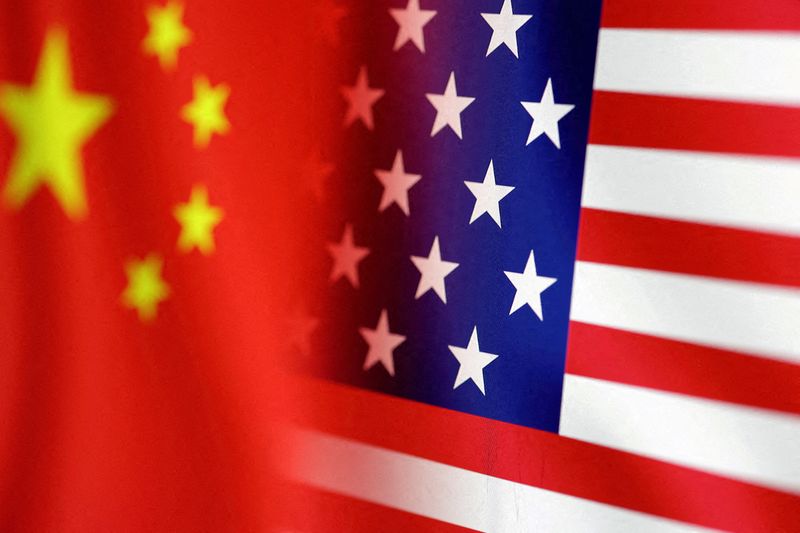By Alexandra Alper
WASHINGTON (Reuters) - The Biden administration's latest round of export curbs on China is part of a two-pronged strategy aiming to halt Beijing's technological advances over fears it could use the innovations to bolster its military, while at the same time spending billions to lure more chip manufacturing back to the U.S.
On Tuesday, the U.S. announced new measures that seek to tighten restrictions and close loopholes in a slew of new rules announced last October. Those rules aimed to stem the flow of high-end American artificial intelligence chips and chipmaking tools into China.
As the United States has slashed the amount of top technology headed to China, it has also been using the promise of billions of dollars of funding to entice non-Chinese chipmakers to set up shop, or expand operations, in the United States.
"Chips are at the center of the administration's economic security and national security agenda when it comes to managing the competition with China," said Emily Kilcrease, senior fellow at the Center for a New American Security and former deputy assistant U.S. Trade Representative.
The United States has been locked in a technology war with China since former President Trump blacklisted Chinese telecoms giant Huawei in 2019. The move heightened tensions between the two countries and forced U.S. suppliers to get a special license before selling to the company.
While President Joe Biden has taken aim at fewer big-name Chinese companies since taking office in 2021, his administration has stepped up its efforts to keep China from advancing in three key fields: semiconductors, artificial intelligence, and quantum computing.
The best examples of these efforts are the export controls unveiled last October, and an executive order released in August, which forces investors to notify the government of most transactions in those sectors while banning a smaller subset.
“The Biden administration is pivoting from a prior strategy of 'the U.S. should stay a couple generations ahead of China in chip design and manufacturing' to 'we should stay as far ahead as we can on chip design and manufacturing,'” said Peter Harrell, a former Biden administration official who said the change was due to a recognition of the wide range of applications for semiconductor chips with national security implications.
China has reacted to the measures by accusing the U.S. of using national security to justify economic bullying of its companies. It has also hit back with raids of U.S. businesses operating there and banned Chinese companies from working with U.S. chipmaker Micron (NASDAQ:MU).
BILLIONS FOR CHIPS
The United States, meanwhile, has been helping non-Chinese chipmakers negotiate with states like Arizona, Texas and New York to set up shop or grow existing operations.
According to the Semiconductor Industry Association, the share of global semiconductor manufacturing capacity in the U.S. has decreased from 37% in 1990 to 12% in 2022.
With avid White House support, Congress passed the landmark "Chips and Science" law in 2022, which provides $52.7 billion for U.S. semiconductor production, research and workforce development.
Chipmakers both foreign and domestic have lined up to ask for a share of the $39 billion earmarked for semiconductor production, from Taiwan's TSMC to South Korea's Samsung (KS:005930) and U.S.-based Intel (NASDAQ:INTC).
Companies have already announced plans to build or expand U.S.-based fabs, and awards are expected to be announced in short order. Intel, for example, announced a $20 billion investment to build a new mega chip factory in Ohio in January, and hopes to use some of the Chips and Science Act money to pay for it.
Beyond the tech realm, the U.S. and China remain at odds over issues from Taiwan and tension in the South China Sea to trade, fentanyl and human rights.
